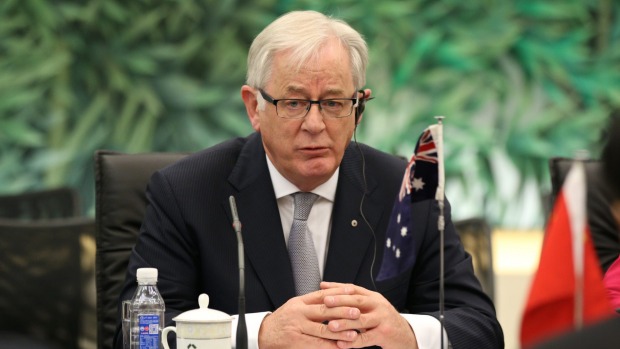
Trade Minister Andrew Robb says the Trans Pacific Partnership negotiations are at “a make-or-break point” over the next month. Photo: Sanghee Liu
Australian health, environment and public welfare regulation, including plain tobacco packaging legislation, will be open for challenge from largely US-based corporations, if a new deal that is part of the Trans Pacific Partnership goes through.
WikiLeaks has revealed that the Australian government is close to agreement on a wide-ranging trade deal that could allow multinational corporations to challenge these regulations as well as local food safety standards. The new TPP free trade agreement will cover approximately 40 per cent of the world economy.
Intellectual property law expert, Australian National University Associate Professor Matthew Rimmer says the WikiLeaks publication is “a bombshell” that will “galvanise resistance and opposition to fast-tracking of this mega trade deal”.
“The investment chapter serves to boost the corporate rights and powers of multinational companies … at the expense of democratic governments and domestic courts,” Dr Rimmer said.
A secret draft chapter of the TPP free trade agreement, published by WikiLeaks on Thursday, shows that the Abbott government is prepared to accept a controversial Investor State Dispute Settlement (ISDS) process if “certain conditions” are met in a broad agreement that it hopes will enhance Australian access to US and Japanese agricultural markets.
Trade Minister Andrew Robb says the TPP negotiations are at “a make-or-break point” over the next month, with potentially huge trade benefits at stake as well as major strategic interests in relation to the United States “pivot to Asia”.
WikiLeaks latest disclosure of the secret TPP negotiations will fuel political debate as both the Labor opposition and Australian Greens have expressed strong opposition to inclusion of ISDS provisions in the TPP, pointing out that the former Howard government rejected such a provision in the Australia’s bilateral free trade agreement with the US.
Trade officials from the US and 11 other Pacific Rim nations – Australia, Brunei, Canada, Chile, Japan, Malaysia, Mexico, New Zealand, Peru, Singapore and Vietnam – are engaged in intensive, closed-door negotiations to finish the TPP in the next few months.
The leaked investment chapter text would empower foreign firms to directly “sue” governments in extrajudicial ISDS tribunals over domestic policies that that foreign firms claim violate their investor rights.
In these tribunals, outside the framework of domestic courts, they could demand taxpayer compensation for financial, health, environmental, land use and other policies and government actions they claim undermine TPP foreign investor rights to fair and equal treatment.
Foreign investors would be able to take action against any level of Australian government – national, state governments or local councils.
The Philip Morris tobacco company is currently using the ISDS provisions of Australia’s investment agreement with Hong Kong to sue the Australian government for billions of dollars over Australia’s plain packaging legislation.
The leaked draft TPP investment chapter is dated January 20, 2015, showing that much of the text was settled before the last two rounds of negotiations at the end of February and the first week of March.
ISDS provisions are already contained in four of Australia’s free trade agreements – with Singapore, Thailand, Korea and the ASEAN-Australia-New Zealand free trade agreement. Australia also has ISDS provisions in its 21 investment protection and promotion agreements.
The previous Labor government also adopted a policy against ISDS from 2011, and inserted a footnote in the TPP investment text which stated that Australia did not agree to ISDS provisions being applied to Australia.
The new leaked text shows that this footnote remains but with an additional sentence, added by the Abbott government, noting that Australia will agree to remove it and agree to ISDS if “certain conditions” are met.
The draft text further reveals that the Australian government is seeking specific exemptions from ISDS to “any measures comprising or related to the Pharmaceutical Benefits Scheme, Medicare Benefits Scheme, the Therapeutic Goods Administration and the Office of the Gene Technology Regulator”. The last organisation deals with the regulation of genetically modified crops and food in Australia.
These proposed exceptions have not been agreed. Exemptions to ISDS are known to be strongly opposed by US financial, pharmaceutical and agribusiness companies which are most likely to launch ISDS cases.
Earlier this month Mr Robb told Fairfax Media that he was subject to cabinet instructions to protect Australian health interests. “We’re not going to accept any outcome which would adversely affect our health system, end of story,” said Mr Robb.
Dr Patricia Ranald, research associate at the University of Sydney and convenor of the Australian Fair Trade and Investment Network, emphasised the limited scope of Australia’s proposed exemptions for the PBS , Medicare, therapeutic goods and gene technology regulation: “What other Australian institutions could be exposed to ISDS ? What about the proposed legislation for food labelling in the wake of the contaminated berries scandal?”
Environmentalists remain concerned that mining companies will use the investment regime to lock in fossil fuel investments including fracking projects at a time at when climate change campaigners argue there should be fossil fuel divestment.
